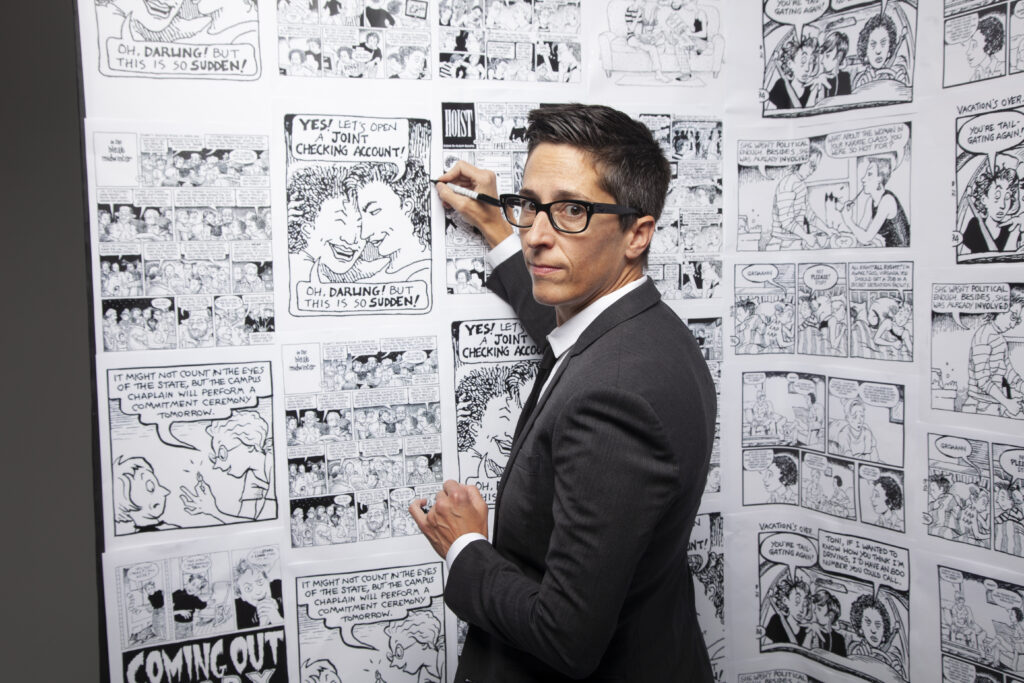Vivian Kleiman is a Peabody Award-winning filmmaker. A longtime producer with storied filmmaker Marlon Riggs, her credits include additional cinematography on his landmark documentary “Tongues Untied.” Kleiman was nominated for an Emmy Award for Outstanding Individual Achievement for her work with Riggs on “Color Adjustment.”
“No Straight Lines: The Rise of Queer Comics” is now playing at the Laemmle Glendale in Los Angeles.
W&H: Describe the film for us in your own words.
VK: When Alison Bechdel’s “Fun Home” was Time Magazine’s 2006 Book of the Year, it heralded the acceptance of queer comics in mainstream America. “No Straight Lines” is the story of queer comics, from the marginalized Underground Comix scene of the early ’70s to international recognition.
W&H: What drew you to this story?
VK: An editor, Greg Sirota, and Justin Hall, an expert in queer comics, encouraged me to attend the first international conference of queer comic book artists. I walked in the conference hall and saw a young person with chartreuse-colored hair talking with an older man with a bald head, an Ivy League-collared striped shirt, and a paunch. They were surrounded by gender-fluid, non-binary artists who were slapping zines in each other’s hands. It was a casting director’s dream.
Over the course of the conference, one after the other, the older generation of artists detailed the road they travelled. The stories were funny and poignant, tragic and inspiring. So, I wanted to make a film that explored the sweeping history of queer comics, their place in the broader history of queer culture and rights, and their impact on social and political movements.
W&H: What do you want people to think about after they watch the film?
VK: I made the film for all the young people out there who are struggling with self-acceptance, so they won’t feel so alone, because queer comics made our lives visible.
W&H: What was the biggest challenge in making the film?
VK: “No Straight Lines” is comprised of several distinctive narrative threads: it’s part portrait of five scrappy queer comic book artists; it’s part recounting of five decades of queer life in the U.S.; and it’s part story of a DIY art form that was formerly considered junk food for kids.
Braiding those distinctively different strands was the central challenge of the film.
W&H: How did you get your film funded? Share some insights into how you got the film made.
VK: “Independent filmmaking” is actually a misnomer. It really should be called “dependent filmmaking.” We depend on the support of individual philanthropists and, when lucky, highly competitive foundation grants to support this level of complicated filmmaking. So, much of my time was spent in a cycle of writing proposals, constant rejection, and pushing forward nonetheless.
We also had a successful but grueling Kickstarter campaign that helped spread buzz.
W&H: What inspired you to become a filmmaker?
VK: Documentary filmmaking engages me on several levels: my involvement with the visual arts, my curiosity about the world, and my pleasure in meeting people who are very different from me, and who I’d otherwise never have an excuse to meet. It’s also a great format for influencing a very wide audience: a broadcast evening on national PBS can reach five million viewers.
W&H: What’s the best and worst advice you’ve received?
VK: The very best advice I’ve received is: “Perfection is the enemy of done.”
I don’t recall getting bad advice, but I have received negative feedback on rough cuts, which I take as a challenge to improve the film.
W&H: What advice do you have for other women directors?
VK: We live in an exciting time for innovative storytelling. Take risks and follow your passion.
W&H: Name your favorite woman-directed film and why.
VK: Agnès Varda’s “The Gleaners & I” was a hugely impactful work because the director was creating her own filmic language untethered to the accepted conventions of documentary filmmaking.
W&H: How are you adjusting to life during the COVID-19 pandemic? Are you keeping creative, and if so, how?
VK: In the Age of the Pandemic, I managed to take the social isolation and the absence of the distractions of daily life — seeing films, going to museums, etc. — and place it in service of finishing my film. My team of collaborators worked in different continents, and different cities, putting technology to good use to edit remotely and complete post-production. It was an amazing example of resilience and team effort.
W&H: The film industry has a long history of underrepresenting people of color onscreen and behind the scenes and reinforcing — and creating — negative stereotypes. What actions do you think need to be taken to make it more inclusive?
VK: In documentary film, one of the key challenges of attracting and retaining POC is funding. Here in the San Francisco Bay Area, it’s no secret that jobs in the tech world pay a crazy generous salary that documentary filmmaking cannot offer.
At the same time, we need to promote organizations like the Brown Girls Doc Mafia, which makes it easy to find talented POC.







